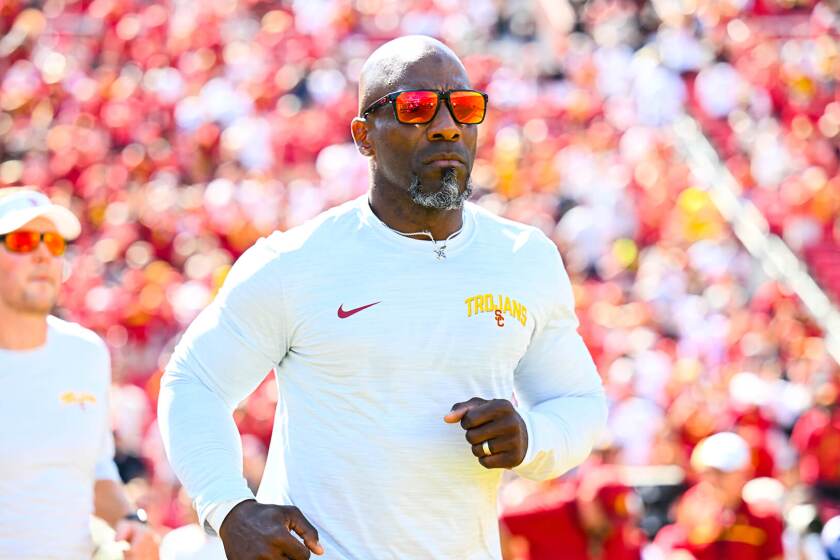Coaches Ask Congress to Keep Hands Off NCAA : Graduation rates: Raveling, Phelps say the problems start before athletes reach college.
- Share via
WASHINGTON — College coaches and administrators appealed to Congress Thursday not to intervene in collegiate sports to improve athletes’ poor graduation rates, saying that the root of the problem is elsewhere.
Former Notre Dame basketball coach Digger Phelps blamed shoddy educational standards at lower levels and the reluctance of Americans to spend money on schools.
George Raveling, head basketball coach at USC for five years, warned that more tutoring and special treatment for athletes will only stir resentment among nonathletes. “Normal students are going to rise up and say, ‘I’m paying $24,000 a year to go to USC. Why aren’t these resources being directed to me?’ ” he said.
But members of a House subcommittee weighing the issue were openly skeptical. With the “zillions of dollars” earned by college sports, schools certainly can afford more tutoring or preparatory help for recruits with poor educational backgrounds, said Rep. Cardiss Collins (D-Ill.), chairman of the House Energy and Commerce subcommittee on commerce.
Collins said only 26.6% of black student-athletes in the football and basketball are graduating, compared with about 50% of all athletes.
Phelps said the debate is occurring while cities are cutting basic education and the government has cut supplemental programs.
“We give tornado relief, but we don’t give relief to education,” he said. “The federal government should act on education in general before acting on the NCAA.”
Raveling said: “The fact that we pay the mailman more to deliver our children’s magazines than we do the schoolteacher to teach the child how to read that magazine speaks directly to the source of our educational problems in America.”
But Collins, who represents an inner-city Chicago district, and subcommittee member Tom McMillen (D-Md.), a former professional basketball player, rejected the coaches’ warnings.
Collins asked why the NCAA, with the money it obtains from television contracts, cannot set up a preparatory school such as those maintained by the U.S. service academies.
William Friday, president emeritus of the University of North Carolina and co-chairman of a commission set up by the NCAA to improve athletes’ academic performance, countered that the armed services’ goal of training military leaders differs from the universities’ goal of general education. And he questioned the constitutionality of providing special schools for athletes.
But Richard E. Lapchick, director of the Center for the Study of Sport in Society at Boston’s Northeastern University, said the gap between the black graduation rate of 26.6% and the white athletes’ rate of 53.9% could widen because the rate of whites has improved nearly 80% since the mid-1980s. The rate for blacks has improved by less than one-third, he said.
“Blacks drop out at alarming rates in their fourth and fifth years--28.2% of all blacks versus 10.7% of whites leave in those years, presumably after their eligibility has expired,” Lapchick said.
More to Read
Go beyond the scoreboard
Get the latest on L.A.'s teams in the daily Sports Report newsletter.
You may occasionally receive promotional content from the Los Angeles Times.





